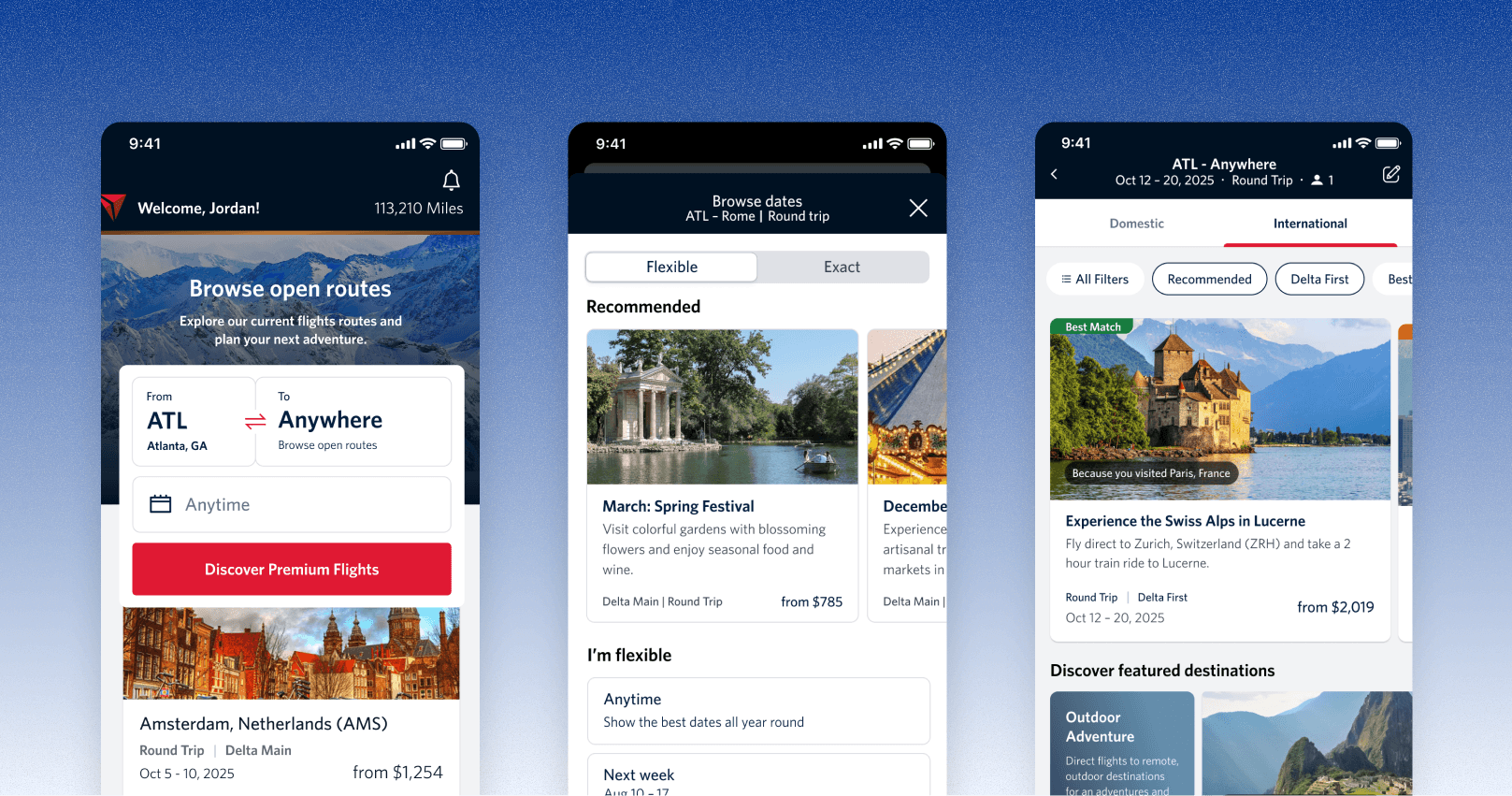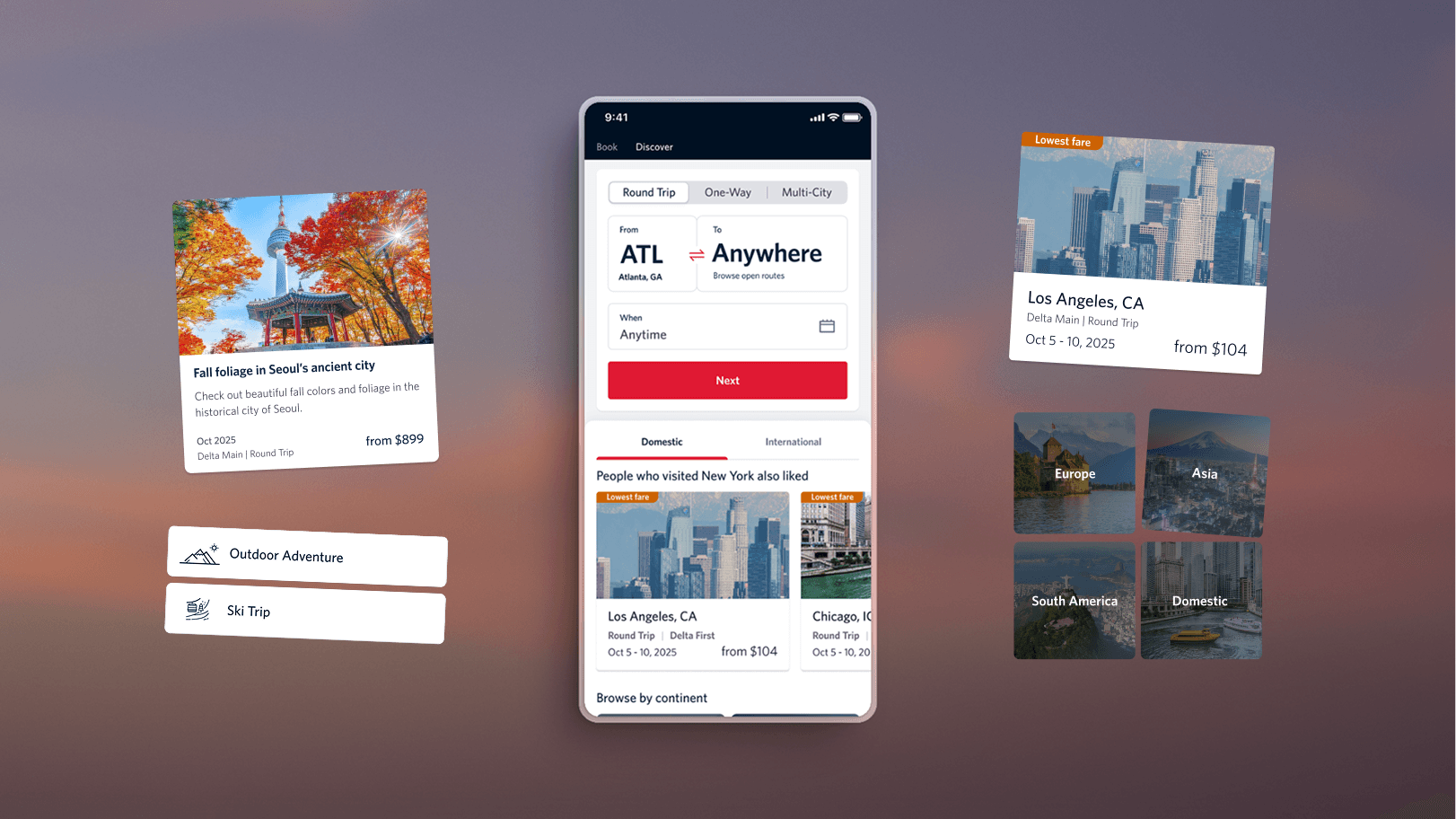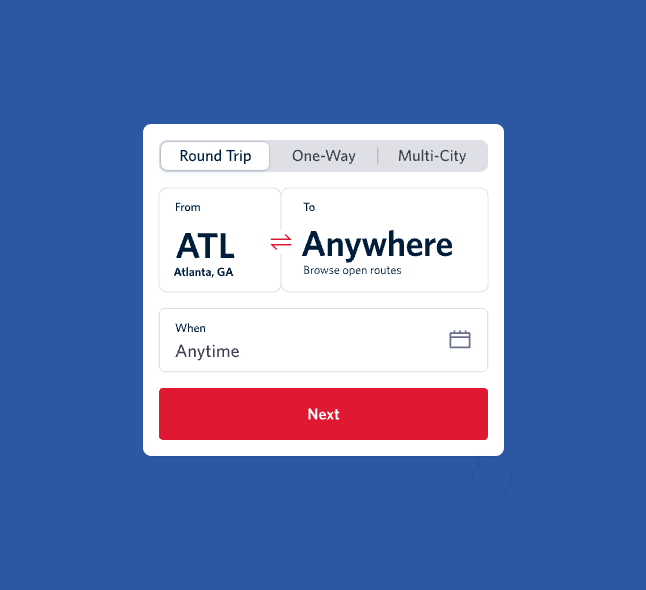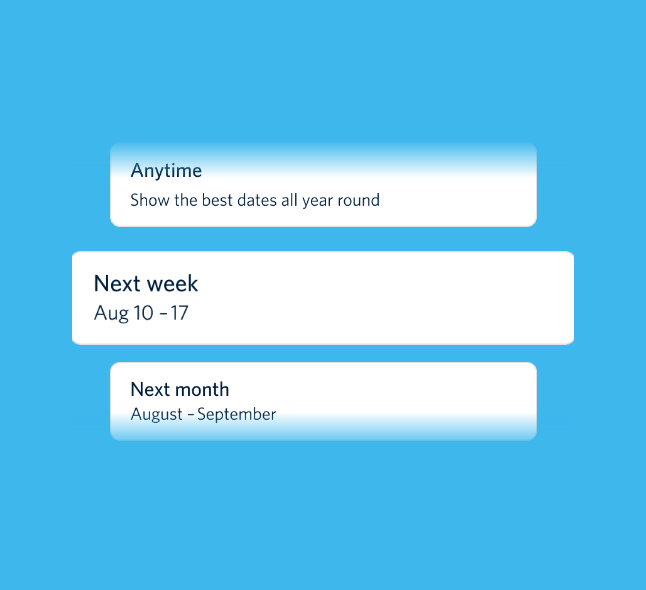Innovating customer’s search and browse experience for the future at Delta Air Lines
As one of the biggest commercial air lines in the U.S., Delta serves many customers with different needs. As the innovation design intern, I identified core opportunities in the current search and browse ecosystem in the Fly Delta app and Delta’s website and delivered solutions aligned with the company’s strategic innovation roadmap.
I pitched my proposal near the end of my internship and secured approval from the managing director. My pitch also received positive feedback up to the VP level.
Designer, Engineering Lead, Strategy Lead
2 weeks, July 2025
Strategic Design
Cross-Functional Collaboration
Vision and Scoping
Critical User Journey
Wireframing
Stakeholder Communication
What is flexible search?
I created an end-to-end design and strategy solution that can be encompassed by the following vision:
Flexible Search is an exploratory search experience that makes booking feel seamless, personalized, and exciting for hesitant “browsers” and helps them become confirmed travelers
Go anywhere, whenever
Browse flexible dates and times
Find personalized recommendations
For travelers without a set date or destination in mind, Delta offers limited ways to browse their inventory and explore options for their next trip
Current user flow audit reveals drop-off points and key opportunities for surfacing personalized products
Current offerings on Delta dot-com such as “Current Flight Deals,” Flexible Dates calendar, and “Deals and Destinations” are not yet available in FlyDelta and integrated seamlessly into the customer journey.
Losing coversion to external platforms due to missing search and explore functionalities
A significant portion of bookings come from external platforms, even for loyal customers and members.

I just always made flight reservations with online platforms.
– Jessica (SkyMiles Member)
I fly Delta, but usually just book through Hopper
– Elyse (Non-Member)
Search interfaces are rapidly evolving in the age of AI. Users use search and natural language interfaces and expect to see the best results for them. How might Delta evolve to meet the needs and expectations of future customers?
How might we make it easier for customers without a date and/or destination in mind to browse Delta’s inventory and discover their next trip?
Understanding existing tech and data infrastructure
I had 1:1 conversations with tech leads to understand the existing infrastructure. It gave me a solid idea of the input and outputs that are possible with flexible search. I can’t share much due to NDA :)
Affinity mapping of insights from cross-functional leaders
Because this started out as a solo passion project, I took many initiatives to speak with relevant project owners to gain crucial information and discuss potential ideas.
Aligning with core user and marketing segments
To make the vision compelling, I aligned my vision with company wide customer segments and articulate the alignment of the solution with their needs and wants. I can’t share any specifics because this contains proprietary information.
Solving the right problem with critical user journey + defining the core use cases
Mapping customer intents and establishing a framework for exploring design solutions
Before jumping into ideation, I started by defining the intents and use cases for the new flexible search experience. Using a clearly defined journey map and three different intents, I added structure to subsequent design explorations.
The eigen-use case: Helping customers figure out when and where to travel
Taking a closer look at the customer journey segment and intents, I defined the goal of the search experience: to help customers figure out when and where to travel with flexible search + displays of destination and date information. Below is a simple mapping I used to convey this idea.
Exploring different modes of AI search interfaces to align with strategic roadmap
Starting broad, I explored various entry points to incorporate flexibility & personalization at core nodes in the search journey; these experiments were meant to be broad and to raise questions about my vision
After presenting initial solutions to stakeholders, I decided to explore near term solutions to provide more clarity on how to actually ship this feature.
Displaying flexible and personalized results in a feed to encourage browsing
Entry point
First, I iterated on the entry point of the new search experience – users encounter a search box that allows them to search without entering a date. The area below the search box is populated with a feed for free exploration.
Creating jumping-off points that help users narrow down their options
Whereas the original flow consisted of a rigid structure going from destination to checkout, a more flexible flow accommodates for various intents by showing various kinds of results
Creating the building blocks for search results using systems thinking and atomic design
My iterations focused on designing these different types of jumping off points at the atomic level:
Dynamic interfaces for different user intents to optimize personalization
Leveraging my mapping of user intent from the research & scoping phase, I defined how atomic elements populate the page depending on the intent. This approach allows the algorithm to respond to specific needs presented by different and diverse types of users.
Helping users choose the right dates with compelling, relevant suggestions
Introducing the Fare Calendar
The fare calendar is a common feature in other platforms for flexible travelers; I set out to design Delta’s version.
Contextual interface showing different date options depending on user input
The overall strategy is to display compelling, specific, and contextual information about different dates. I also use UX psychology is to surface narrower options that force the user to think about their trip without feeling boxed in by a specific date and destination.
Planting the seed for flexible search
While a self-initiated project completed in a short amount of time, Flexible Search and Personalization received positive feedback up to the director level because of how I leveraged storytelling and stakeholder engagement to create compelling value.
Balancing baby steps and far vision
One of the biggest challenges in this project is scoping and pushing for innovation rather than being solely bogged down in short-term fixes. I made sure















